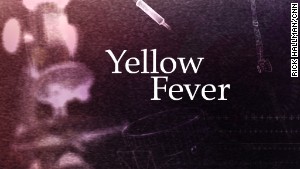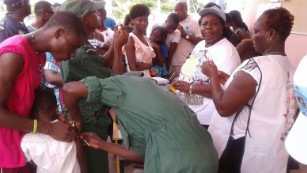(CNN)The World Health Organization said Wednesday that the ongoing yellow fever outbreak in Angola and the Democratic Republic of Congo still does not constitute a public health emergency at this time, but caution is still necessary.
"Although the yellow fever situation is improving, the event continues to be serious and requires sustained, controlled measures," said Oyewale Tomori, chairman of the WHO Emergency Committee and a professor of virology at Redeemer's University in Nigeria.
All told, the WHO estimates that there have been 6,000 suspected cases and 1,000 laboratory-confirmed cases of yellow fever, a viral hemorrhagic disease transmitted by infected mosquitoes. More than 400 people have died since the epidemic began in December.
But there is reason to be optimistic. Though suspected cases continue to be reported, the last confirmed cases were reported June 23 in Angola and July 12 in Congo, said Dr. Peter Salama, executive director of the WHO Health Emergency Program.
"The health and epidemiology are pointing in the right direction," Salama said.
The epicenter of the outbreak was Angola, which first reported cases in its capital city, Luanda, in late December. From there, the fever spread to 16 of the country's 18 provinces. In Congo, the outbreak was declared April 23, with health officials confirming cases in eight of its 26 provinces, some imported directly from Angola.
Symptoms include fever, headache, jaundice, muscle pain, nausea, vomiting and fatigue. A small proportion of patients develop severe symptoms, and nearly half of these die within 10 days.
Salama said the WHO's yellow fever vaccination stockpile remains intact, with 6 million current doses ready to be accessed in case it's needed. The WHO official said the stockpile is expected to total 20 million doses by the end of this year thanks to scaled-up production by the four major companies that manufacture the effective inoculation.
Both of the WHO representatives pointed to success in Kinshasa, the capital and largest city of Congo, where the health ministry and the WHO launched the most ambitious yellow fever vaccination campaign ever undertaken. They coordinated with Médecins sans Frontières, the International Federation of the Red Cross and UNICEF. "In just 10 days, 7.7 million people were vaccinated using fractionated doses," Tomori noted.
"Fractionated dosing," using just one-fifth the standard dose of the vaccine, was recommended this month by an advisory group as the best way to maximize the limited supply of vaccines, which requires at least six months to manufacture. Health officials had warned that a vaccine supply shortage could jeopardize the ability to end the outbreak.
During the recent campaigns in both countries, Angola vaccinated 22 million people, and Congo inoculated 14 million people, Salama said. He said there have been "operational challenges" around getting vaccines to rural parts of the countries and the "unprecedented situation" of urban outbreaks. But he said the vaccination campaign had not been mismanaged.
"As the rainy season is imminent in Central and East Africa, we also have to be aware there may be further cases, there may be further outbreaks, and we need to remain vigilant and able to respond robustly," Salama said.



No comments:
Post a Comment